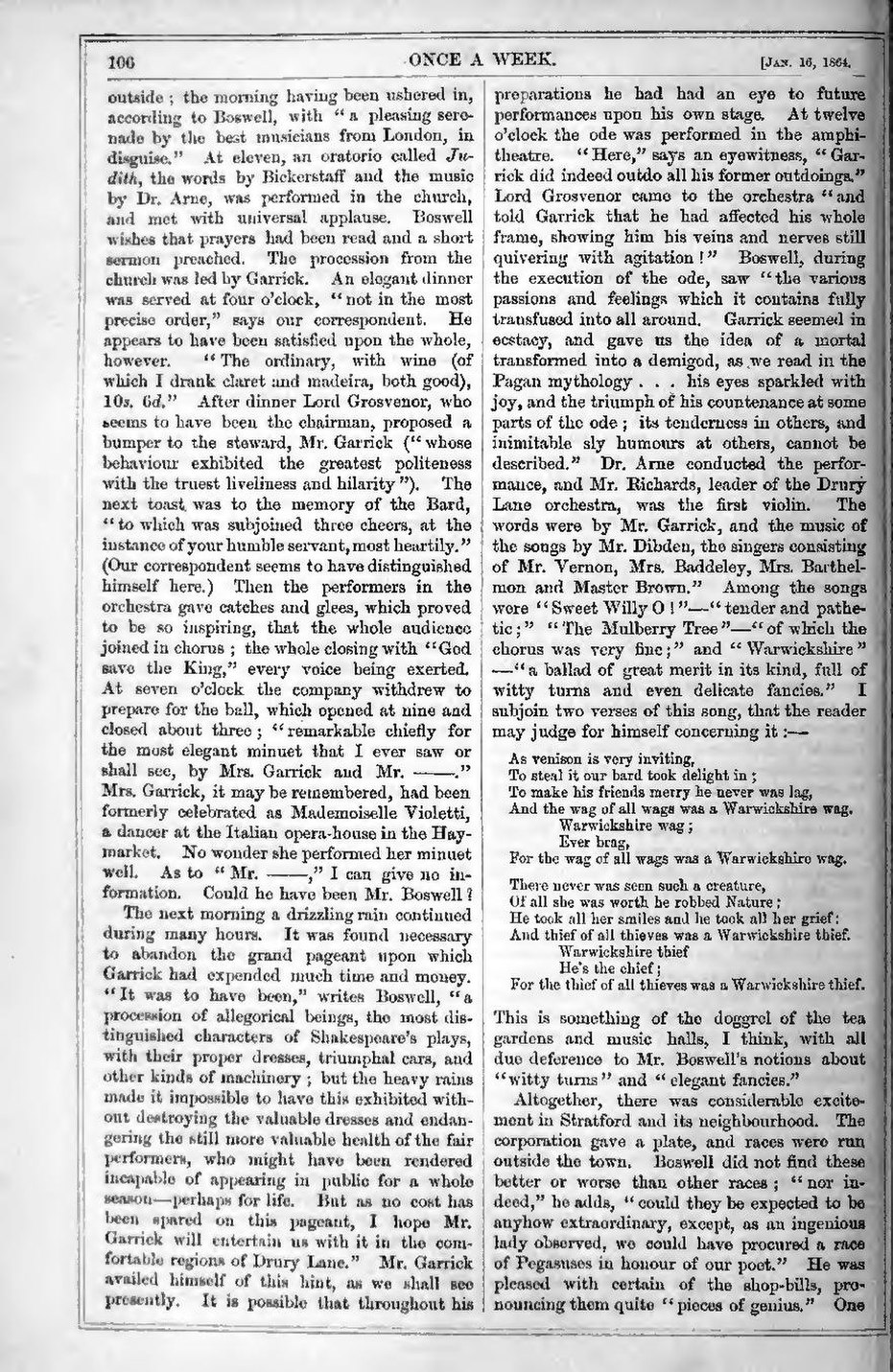outside; the morning having been ushered in, according to Boswell, with “a pleasing seronade by the best musicians from London, in disguise.” At eleven, an oratorio called Judith, the words by Bickerstaff and the musicby Dr. Arne, was performed in the church, and met with universal applause, Boswell wishes that prayers had been read and a short sermon preached. The procession from the church was led by Garrick. An elogant dinner was served at four o’clock, “not in the most precise order,” says our correspondent. He appears to have been satisfied upon the whole, however. “The ordinary, with wine (of which I drank claret and madeira, both good), 10s, 6d.” After dinner Lord Grosvenor, who seems to have been the chairman, proposed a bumper to the steward, Mr. Garrick (“whose behaviour exhibited the greatest politeness with the truest liveliness and hilarity”). The next toast, was to the memory of the Bard, “to which was subjoined three cheers, at the instance of your humble servant, most heartily.” (Our correspondent seems to have distinguished himself here.) Then the performers in the orchestra gave catches and glees, which proved to be so inspiring, that the whole audience joined in chorus; the whole closing with “God save the King,” every voice being exerted. At seven o'clock the company withdrew to prepare for the bell, which opened at nine and closed about three; “remarkable chiefly for the must elegant minuet that I ever saw or shall see, by Mrs. Garrick and Mr. ―.” Mrs, Garrick, it may be remembered, had been formerly celebrated as Mademoiselle Violetti, a dancer at the Italian opera-house in the Hay-market, No wonder she performed her minuet well. As to “Mr.―,” I can give no information.
during many hours. to abandon the grand pageant upon which Garrick had expended much time and money.
- It was to have been,” writes Boswell, “a
procersion of allegorical beings, the most dis- tinguished characters of Shakespeare's plays, with their proper dresses, triumphal cars, and other kinds of machinery ; but the heavy rains made it impossible to have this exhibited with- out destroying the valuable dresses and endan- gering the still more valuable health of the fair performers, who might have been rendered incapable of appearing in public for a whole | sxeanon—perhaps for life. Bnt as no cost has
been spared on this pageant, I hope Mr, | Garrick will entertain us with it in the oon- fortable regions of Drury Lane.” Mr. Garrick availed himself of this hint, as we shall seo haa It is possible that throughout his
the whole closing with ‘*God | save the King,” every voice being exerted,
preparations he had had an eye to futux performances upou his own stage, At twe o'clock the ode was performed in the am; theatre. ‘* Here,” says an eyewitness, “ rick did indeed outdo all his former outdoin Lord Grosvenor cams to the orchestra “and told Garrick that he had affected his whold frame, showing him his veins and nerves still quivering with agitation!” Boswell, durimg the execution of Behe ode, saw “the various passions and feelings which it contains fully transfused inte all around. Garrick seemed in ecstacy, and gave us the iden of « mortal transformed into a demigod, as we read in the Pagan mythology. . . his eyes sparkled with joy, and the triumph of his countenance at some. parts of the ode; its tenderness in others, and inimitable sly humowrs at others, cannot be deseribed.” Dr. Are conducted the perfor- mance, and Mr. Richards, leader of the Drury Lane orchestra, was the firsb violin. The words were by Mr. Garrick, and the music of the songs by Mr. Dibden, the singers eae of Mr. Vernon, Mrs. Baddeley, Mrs. Barthel- mon and Master Brown.” Among the songs wore ‘‘Sweet Willy O ! ’—-‘‘ tender and pathe- tic;” ‘The Mulberry Tree”—*‘ of which the ehorus was yery fine;” and “‘ Warwickshire ” —‘‘a ballad of great merit in its kind, fnll of witty turns and even delicate fancies.” T subjoin two verses of this song, that the reader may judge for himself concerning it :——
As venison is very inviting,
To steal it our bard took delight in ;
To make his friends metry he never was lag,
And the wag of all wags was s Warwickshire wag, Warwickshire wag ; Ever brag,
For the wag of all wags was a Warwickehiro wag,
There never was s¢en such a creature,
Conld he have been Mr. Boswell # | The next morning a drizzling rain continued | It was found wecessary |
Ot all she was worth he robbed Nature; . He took all her smiles and he teck all her grief: And thief of ail thieves was a Warwickshire thief Warwickshire thief He's the chief ; For the thief of all thieves waa a Warwickshire thief.
This is something of the dogercl of the tea gardens and music halls, I think, weit all dus deference to Mr, Boswell’s notions about “witty tums” and “ elegant fancies.” é Altogether, there was considernbla exeite-
| Ment in Stratford and its neighbourhood. The corporation gave a plate, and races were rut
| outside the town, Boswell did not find tl better or worse than other races; ‘ner | deed,” he adds, ‘‘ could they be expected to anyhow extraardinary, except, as an ingen lady observed, we sonld have procured a 7 of Pegasuses in honour of our poct.””? He pleased with certain of the shop-bills, pro
nouncing them — os en of genius,” One